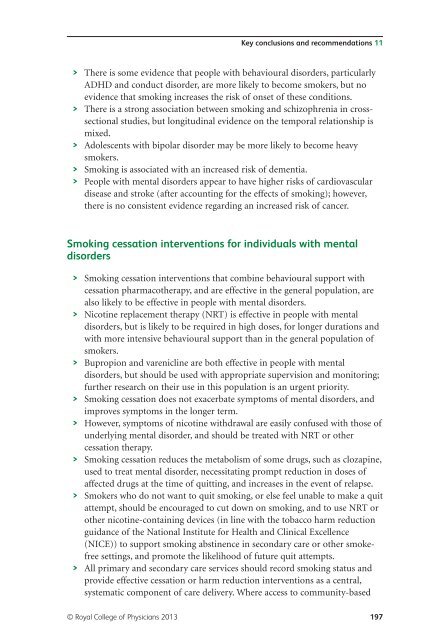Smoking and mental health - NCSCT
Smoking and mental health - NCSCT
Smoking and mental health - NCSCT
Create successful ePaper yourself
Turn your PDF publications into a flip-book with our unique Google optimized e-Paper software.
Key conclusions <strong>and</strong> recommendations 11<br />
> There is some evidence that people with behavioural disorders, particularly<br />
ADHD <strong>and</strong> conduct disorder, are more likely to become smokers, but no<br />
evidence that smoking increases the risk of onset of these conditions.<br />
> There is a strong association between smoking <strong>and</strong> schizophrenia in crosssectional<br />
studies, but longitudinal evidence on the temporal relationship is<br />
mixed.<br />
> Adolescents with bipolar disorder may be more likely to become heavy<br />
smokers.<br />
> <strong>Smoking</strong> is associated with an increased risk of dementia.<br />
> People with <strong>mental</strong> disorders appear to have higher risks of cardiovascular<br />
disease <strong>and</strong> stroke (after accounting for the effects of smoking); however,<br />
there is no consistent evidence regarding an increased risk of cancer.<br />
<strong>Smoking</strong> cessation interventions for individuals with <strong>mental</strong><br />
disorders<br />
> <strong>Smoking</strong> cessation interventions that combine behavioural support with<br />
cessation pharmacotherapy, <strong>and</strong> are effective in the general population, are<br />
also likely to be effective in people with <strong>mental</strong> disorders.<br />
> Nicotine replacement therapy (NRT) is effective in people with <strong>mental</strong><br />
disorders, but is likely to be required in high doses, for longer durations <strong>and</strong><br />
with more intensive behavioural support than in the general population of<br />
smokers.<br />
> Bupropion <strong>and</strong> varenicline are both effective in people with <strong>mental</strong><br />
disorders, but should be used with appropriate supervision <strong>and</strong> monitoring;<br />
further research on their use in this population is an urgent priority.<br />
> <strong>Smoking</strong> cessation does not exacerbate symptoms of <strong>mental</strong> disorders, <strong>and</strong><br />
improves symptoms in the longer term.<br />
> However, symptoms of nicotine withdrawal are easily confused with those of<br />
underlying <strong>mental</strong> disorder, <strong>and</strong> should be treated with NRT or other<br />
cessation therapy.<br />
> <strong>Smoking</strong> cessation reduces the metabolism of some drugs, such as clozapine,<br />
used to treat <strong>mental</strong> disorder, necessitating prompt reduction in doses of<br />
affected drugs at the time of quitting, <strong>and</strong> increases in the event of relapse.<br />
> Smokers who do not want to quit smoking, or else feel unable to make a quit<br />
attempt, should be encouraged to cut down on smoking, <strong>and</strong> to use NRT or<br />
other nicotine-containing devices (in line with the tobacco harm reduction<br />
guidance of the National Institute for Health <strong>and</strong> Clinical Excellence<br />
(NICE)) to support smoking abstinence in secondary care or other smokefree<br />
settings, <strong>and</strong> promote the likelihood of future quit attempts.<br />
> All primary <strong>and</strong> secondary care services should record smoking status <strong>and</strong><br />
provide effective cessation or harm reduction interventions as a central,<br />
systematic component of care delivery. Where access to community-based<br />
© Royal College of Physicians 2013 197














